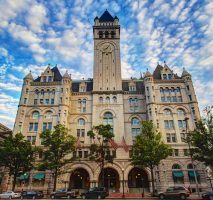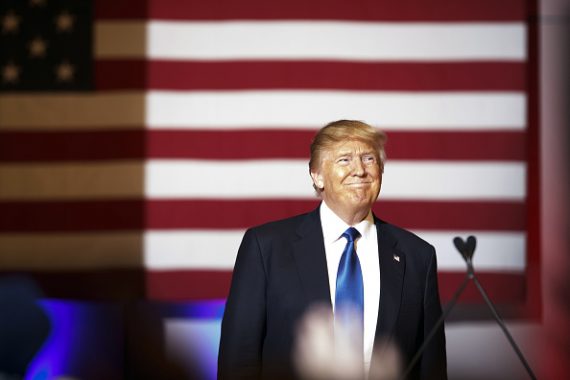On Thursday, news broke that President-elect Donald Trump is in talks with Deutsche Bank to remove personal guarantees from real estate loans on his properties, in an apparent bid to avoid conflicts of interest.
But these loans, totaling $300 million, are likely just the starting point when it comes to Trump’s personal entanglements with his real estate empire. Various real estate contracts of the type Trump has signed routinely contain clauses that may tie him to the properties his company owns.
If Trump wants to legally separate himself from his businesses – as he publicly indicated he might – he would likely have to renegotiate numerous contracts first. It’s unclear how many contracts there might be, but such a process could be lengthy, complicated and could see those on the other side of the contracts try to curry favor with him, real estate finance sources said.
Removing personal guarantees from loans is tough, said Chris Delson, a real estate attorney at Morrison Foerster. “From a lender’s standpoint, what’s their incentive to do that?” he said, speaking generally about personal recourse construction loans. “There may not be much of one.” (Of course, when the borrower is the president-elect, the norms may not apply.)
Trump funded the hotel conversion of the federally owned Old Post Office building on Pennsylvania Avenue in Washington, D.C. with a $170 million loan from Deutsche Bank’s private banking arm. That same bank unit also issued two mortgages on the Trump National Doral Miami resort and one loan on the Trump Tower in Chicago. Bloomberg reported that three of the four carry personal guarantees by Trump (with the exception of the Chicago loan). The four loans total around $300 million, about half of Trump’s total debts, according to Bloomberg.
Sources said that real estate loans issued by private banking arms usually use a borrower’s personal assets as collateral.
“A real estate loan through a private banking division would typically get a first mortgage as collateral, and then depending on the type of project might also be backed by either a personal guarantee from the private banking client, or by a lien or hold on some portion of the client’s assets that are held at the bank,” said Scott Singer, president of the Singer & Bassuk Organization, speaking generally.
Court records show that Trump previously used his own assets to back a $640 million construction loan from Deutsche Bank’s commercial division for a Chicago skyscraper.
The Trump Organization and Deutsche Bank both declined to comment for this story.
Trump’s outstanding Deutsche Bank loans are particularly problematic for two reasons. First, the U.S. Attorney General’s Office is currently investigating the bank over questionable stock trades involving Russian customers, and Trump’s personal financial ties could become an immediate conflict of interest once he becomes president.
Second, Trump leased the property from the federal government, and four Democratic lawmakers recently argued that he would breach the terms of his lease once he is sworn in as president. (The General Services Administration, which manages federally-owned real estate, said it “can make no definitive statement at this time about what would constitute a breach of the agreement.”)
Trump’s Deutsche Bank loans are just one example of how his personal role in real estate contracts could complicate any plans to cut ties with his businesses. At 40 Wall Street, to which Trump holds the ground lease, he personally guaranteed as much as $26 million in debt, according to a New York Times report from August.
Personal recourse aside, real estate deals often include a so-called “key man” provision that requires a certain individual to remain actively engaged in the property in question. “It’s very common in ownership and JV agreements,” said Carl Schwartz, co-chair of the real estate group at law firm Hunton & Williams. The idea behind the provision is that an individual’s contacts, management skills or personal brand can affect a property’s value, and that it is therefore in the partnership’s interest to make sure that person stays on board.
It isn’t clear whether any of Trump’s real estate ownership or joint-venture agreements include such a key-man provision, as these clauses don’t typically enter the public record. Alan Garten, general counsel at the Trump Organization, did not respond to requests for comment. Kramer Levin’s Jay Neveloff, an attorney who has represented Trump in real estate deals, declined to comment.
Still, sources said Trump’s outsized role in his family company and his brand value make it at least possible some of his real estate contracts contain such a clause.
Trump owns at least two properties in partnership with other real estate firms. He holds 30-percent stakes in The Office Towers 1290 Sixth Avenue in Midtown and 555 California Street in San Francisco. A spokesperson for Vornado Realty Trust, which owns the majority stake in both properties, did not respond to a request for comment.
These provisions also tend to pop up in mortgage documents. It can be included, for example, in a construction loan agreement if the project depends on a developer’s expertise. “In that circumstance it would be difficult for a developer to extricate him- or herself,” Schwartz said.
One source familiar with Trump’s real estate loans said many of his mortgages are non-recourse, meaning there is no direct personal guarantee attached to them. But that doesn’t mean there is no personal liability under any circumstances. Most non-recourse loans include so-called “bad-boy carve-outs,” several sources said. These clauses stipulate that a borrower (either the company or an individual) can become liable for a loan even if it is non-recourse, if the borrower or a related party commits gross negligence, misappropriates rental income, commits certain criminal acts that impact the property, and the like.
“Lenders would love a warm body but sometimes will allow an entity with liquidity to be the guarantor,” said mortgage broker David Eyzenberg, of Eyzenberg & Company.
In the case of 40 Wall Street, a prospectus supplement for a CMBS bond backed by the building’s ground lease (among other properties) notes that “Donald J. Trump is the guarantor of certain nonrecourse carveouts and property expenses under the 40 Wall Street Loan Combination.”

Trump International Hotel in Washington, D.C.
So-called “prohibited transfers” could be another hurdle if Trump wants to rid himself of his businesses or transfer them to a trust. Non-recourse loan documents often contain these clauses, which bans borrowers from selling major stakes in the borrowing entity or giving up control of the borrowing entity, sources say. If such a prohibited transfer occurs, the loan often automatically becomes full recourse and the loan’s guarantor personally liable.
A $950 million CMBS loan on 1290 Sixth Avenue contains such a clause, according to the bond’s offering circular — but Trump is explicitly exempt from it because he only owns a non-controlling stake in the building. The terms of Trump’s non-CMBS loans on other properties aren’t public.
Many of Trump’s creditors are alternative lenders such as Ladder Capital Financial, a real estate investment trust. Traditional banks have been wary of going near Trump for more than a decade, according to multiple news reports. Of course, the big question is whether Trump really wants to fully separate himself from his company.
On Nov. 30, Trump tweeted that “legal documents are being crafted which take me completely out of business operations” because he felt “it is visually important, as President, to in no way have a conflict of interest with my various businesses.” He also announced a Dec. 15 news conference where he would explain details. But on Dec. 12, he postponed the conference until January, without offering a reason.
News reports have raised doubts about whether Trump will truly separate himself from his businesses. Earlier this month, the Times reported that Trump plans to hand over control of the family company to his two adult sons, Donald Jr. and Eric, but wants to keep a stake, resisting calls for divestment.
On Wednesday, Politico reported that Trump’s team is considering setting up a so-called discretionary trust that would allow Trump and his family members to continue earning income from his properties, while still allowing them some insight into how they are run.

